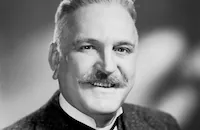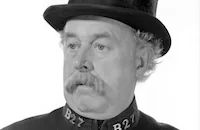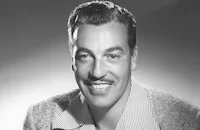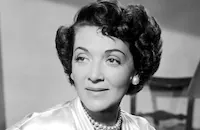The Good Fairy
Brief Synopsis
Cast & Crew
William Wyler
Margaret Sullavan
Herbert Marshall
Frank Morgan
Reginald Owen
Eric Blore
Film Details
Technical Specs

Synopsis
Maurice Schlapkohl, owner of the largest motion picture theater in Budapest, convinces Dr. Schultz of the city's orphanage to allow one of her girls to become an usherette. After Schlopkuhl selects the gregarious, but naive Luisa Ginglebusher, who has just crashed to the floor from a chandelier after acting out the story of "The Good Fairy" for the younger girls, Dr. Schultz warns Luisa about the evils of "the male gender" and instructs her to do good deeds for others. At the theater, Luisa makes the acquaintance of Detlaff, a waiter. When a masher attacks her on the street, she introduces Detlaff as her husband to get him to stop. Detlaff then invites her to an exclusive party at which he will be serving the next evening. At the party, Konrad, the owner of a South American meat packing company, tries to seduce Luisa, and, to escape his grasp, she lies that she is married and that her husband is a lawyer. After Konrad insists upon knowing her husband's name and says that he wants to employ him, Luisa, desiring to do a good deed, picks the name of Dr. Max Sporum from the telephone book and tells Konrad that she is the doctor's wife. The next day, Konrad visits the bearded, stuffy doctor, and after convincing him that his friend Dr. Metz, Minister of Arts and Decorations, has suggested he hire him, Konrad gives him a 10,000 kronen bonus to buy office equipment and signs him to a five-year contract, planning to send him to South America so that he will be able to seduce Luisa in his absence. Curious about Sporum, Luisa visits him, and seeing that he believes his new position came about as the result of his ethical behavior, diligent hard work and integrity, she is unable to inform him the real reason for his good fortune. After she convinces Sporum to get a new suit, clothes, a pink sports car and to shave, he buys her a "Foxine" wrap, which she deeply appreciates, but he gets extremely upset when she must go to meet Konrad, thinking that she is the mistress of a man. Before she gets to Konrad's hotel, she calls Sporum and he apologizes, whereupon she tearfully asks for him to think of her as if she loved him. Detlaff, trying to protect Luisa, follows her to Konrad's rooms, and as Konrad confesses he is not really a playboy, but that he wants to marry her, Detlaff sneaks in, shuts off the lights, hits Konrad and carries Luisa off. Konrad follows them to a taxi, where Detlaff gives him a black eye before driving off. Konrad visits Sporum and when he relates that he saw Sporum's wife in a taxi with a waiter, Sporum reveals that he has no wife. Luisa and Detlaff then arrive, and when she sees Konrad, Luisa tries to devise a story to account for the situation, but she is soon reduced to tears and has to explain everything to everybody, saying that she just wanted to be a "good fairy" to someone. She returns the foxine to Konrad, and Sporum, who is now disillusioned to learn that it was not his integrity which got him the job, but the fact that Konrad was after his "wife," tells Konrad that he will return everything he bought. Konrad tries to propose to Luisa, but she gently rejects him. She is about to leave, when Sporum asks her not to go and kisses her. They vow to get along together, though they will be poor, but Konrad insists on keeping Sporum as his one honest lawyer, after which they all argue, each one claiming to rightfully be the "good fairy." With the other orphans singing, Luisa walks down the aisle at her wedding with Sporum.

Director

William Wyler
Cast

Margaret Sullavan

Herbert Marshall

Frank Morgan

Reginald Owen

Eric Blore

Beulah Bondi

Alan Hale

Cesar Romero
Luis Alberni

June Clayworth
Al Bridge
George Davis

Hugh O'connell
Torben Meyer
Matt Mchugh
Frank Moran
Lillian Lawrence
Edith Kingdon
Irene Homer
Cecile Elliott
Irene Linow
Ann Howard
Florence Enright
Albert Taylor
Arthur Stuart Hull
Dick Winslow
Anne Darling
Phyllis Ludwig
Alene Carroll

Gavin Gordon
Edwin Mordant
Crew
Norbert Brodine
Archie Buchanan
John P. Fulton
John P. Fulton
Charles D. Hall
Henry Henigson
Hans Kraly
Gilbert Kurland
Carl Laemmle Jr.
Carl Laemmle
Daniel Mandell
Vic Noerdlinger
Heinz Roemheld
Freda Rosenblatt
Preston Sturges
Hath Toby
Mary West
William Wyler

Film Details
Technical Specs

Articles
The Good Fairy
The stage version of The Good Fairy had been mounted on Broadway in 1931 with Helen Hayes in the lead. This Universal film version would be remade with Deanna Durbin in 1947 as I'll Be Yours, and later the property was turned into a 1951 Broadway musical entitled Make a Wish, for which Preston Sturges wrote the book.
For a movie as warmly comic and romantic as The Good Fairy, there sure was a lot of intense drama going on behind the scenes. First, the script was not finished when shooting began, and things got to the point where Sturges was revising scenes one day before they were shot. Second, the film's director, William Wyler, was terribly frustrated working at Universal and wanted out. According to Wyler biographer Jan Herman (A Talent for Trouble), he wrote at the time to his brother: "My soul may belong to me, but my body belongs to Universal." Little did Wyler know that this picture would spawn one of the most turbulent and unhappiest periods of his life.
Universal assigned rising star Margaret Sullavan to the project. This was only her third film, but her first two -- Only Yesterday (1933) and Little Man, What Now? (1934) -- had been big hits. She had a screen persona that could be described as magnetic adorable-ness, but in truth this masked a tempestuous and high-strung real-life personality which translated into trouble on the set. Wyler's script girl, Freda Rosenblatt, later said that Sullavan "did spiteful things to get her way. If she was tired and wanted to go home and Willy had one more scene to do, she would smear the makeup on her face. That would mean everything had to stop so she could be made up again. Which might take hours." Sullavan got into heated arguments with Wyler, who later remembered, "We fought over the interpretation of her part. We fought over everything. We didn't get along at all. She had a mind of her own, and so did I."
Eventually, Wyler realized that all the quarreling was noticeably impacting her performance, and he decided that for the good of the film, he would force himself to make peace with her. He took her to dinner, and found to his surprise over the next few days that he was falling in love with her. The feeling was mutual, and in late November 1934, the couple flew to Arizona to be married. The next day they were back at work -- the picture still had three weeks to shoot.
After production, The Good Fairy was edited quickly and released in January 1935. It was a hit. Wyler, meanwhile, was released from his studio contract. In his biography, he is quoted as saying he asked to be released. According to trade paper reports of the time, however, the studio let him go because they had grown frustrated with the slow pace of this film's production -- especially after his marriage. Apparently the studio thought he was wasting too much time taking repeated close-ups of his new bride.
In any event, Wyler was let go, and he and Sullavan embarked on a long European honeymoon. Their marriage then went south fast, with raging arguments that could be heard all over their Bel-Air neighborhood. They were divorced in mid-1936, after 16 months together. Wyler later said that the marriage to "that bratty broad" was "the roughest and meanest [time] of my life."
Despite all their problems, the thing that really ended their relationship was Wyler's discovery that Sullavan had gotten an abortion without even telling him that she was pregnant. She felt a baby would damage her career path, and she had known that Wyler would have wanted to keep the baby. When Wyler found out, he was despondent and knew that they would never be able to work things out.
The peak periods of both Wyler's and Sullavan's careers were still to come. Sullavan would star in such great films as Three Comrades (1938), The Shop Around the Corner (1940) and The Mortal Storm (1940); surprisingly she would end up making just seventeen movies in her entire career, spanning Only Yesterday to No Sad Songs For Me in 1950. (That last one came seven years after her previous movie Cry Havoc [1943].) Wyler would plateau for longer, directing such masterworks as Dodsworth (1936), Jezebel (1938), The Letter (1940), The Best Years of Our Lives (1946), Roman Holiday (1953) and Ben-Hur (1959), among many others.
The Good Fairy was well-received by the public and critics. The New York Times called it "engaging and often uproariously funny" and especially praised the performances of Reginald Owen and Frank Morgan. In all, the paper gave the film the equivalent of an "A" but not an "A+": "The Good Fairy is so admirable that it causes this department to regret that it is not perfect."
Producer: Carl Laemmle, Jr.
Director: William Wyler
Screenplay: Preston Sturges; Jane Hinton (English translation of play); Ferenc Molnar (play "A jo tunder")
Cinematography: Norbert Brodine
Art Direction: Charles D. Hall
Music: David Klatzkin, Heinz Roemheld (both uncredited)
Film Editing: Daniel Mandell
Cast: Margaret Sullavan (Luisa 'Lu' Ginglebusher), Herbert Marshall (Dr. Max Sporum), Frank Morgan (Konrad), Reginald Owen (Detlaff, the Waiter), Eric Blore (Dr. Metz), Beulah Bondi (Dr. Schultz), Alan Hale (Maurice Schlapkohl).
BW-97m.
by Jeremy Arnold

The Good Fairy
Quotes
I can use one honest lawyer, but don't overdo it.- Konrad
When I'm full of Dutch courage, I behave very Frenchly.- Konrad
I see... and what is it you're looking for, Mr. Schlipkohl?- Dr. Schultz
Schlapkohl. Usherettes! To show the customers to their seats. They wear gorgeous uniforms, I designed them myself. A big hussar's hat, a little cloak, and pants with...- Schlapkohl
Pants?- Dr. Schultz
...with stripes. Very effective.- Schlapkohl
I dare say. The, uh, the pants, I mean, they're not too tight?- Dr. Schultz
That depends entirely on the girls, the pants are all the same size.- Schlapkohl
Would you like to be an usherette, Luisa?- Dr. Schultz
Oh, yes, ma'am.- Luisa
Do you know what an usherette is?- Dr. Schultz
N-n-no, ma'am.- Luisa
Never let it be said that a Sporum ever refused the request of a Ginglebusher.- Dr. Sporum
Trivia
Notes
Helen Hayes starred in the Broadway production of the play. Director William Wyler and star Margaret Sullavan eloped to Yuma, AZ on November 25, 1934, during the production period, and married, according to Los Angeles Times. The news item noted that they had met only eight weeks earlier and that Sullavan had walked off the set several times during production after clashes with Wyler. According to a post-production Daily Variety article, the studio experienced difficulties during the filming period because associate producer Henry Henigson was in the hospital and Wyler was "shooting off the cuff" scenes that writer Preston Sturges was preparing daily in an attempt to keep ahead of the production schedule. A Universal Weekly news item stated that Sturges was writing the script only a day of so ahead of the shooting. The Daily Variety article states that Universal dropped Wyler because they were unhappy with the length of time he took and displeased with "repeated shots he made of scenes with Miss Sullavan," and that they dropped Sturges from the payroll three weeks before the film was completed, saying that he was not contributing anything to the film. Variety commented that the production was delayed because of time-consuming close-ups which "brought U [Universal] and the director, William Wyler, to the mat." In autobiographical writings, Sturges states that he signed a contract as a director with Universal on May 28, 1934, but that Henigson asked him to write the adaptation for this film. (Sturges ultimately did not direct a film until the 1940 release The Great McGinty [see below].) Modern sources state that Sturges tailored the female lead to fit Sullavan and that the finished film diverged greatly from the play. In the Universal studio material at the USC Cinema-Television Library, N. Ruhl is listed for this film among miscellaneous staff under the heading "Dialogue." Because no verification that he actually worked on the script has been located, it is not known what Ruhl's contribution was. It is possible that he was dialogue director on the film.
According to information in the MPAA/PCA Collection at the AMPAS Library, the PCA objected to some of the scenes and to many lines in the original script, but because of commitments that the studio made, the PCA allowed them to begin filming before the script was approved. Specifically, the PCA objected to a scene near the beginning of the film, as "Luisa" is about to leave the orphanage, in which Dr. Schultz explains to her the "facts of life." PCA Director Joseph Breen wrote to Harry H. Zehner, the assistant general manager at Universal, that the scene as written "is definitely and gravely objectionable. This material should be deleted. It is our thought that Dr. Schultz' advice to Lu should refer to her general unworldliness rather than-as is suggested in this scene-her ignorance in matters of sex." The other major scenes to which the PCA objected were the scene in which Konrad attempts to seduce Lu in the private dining room and the scene in which Lu goes to Konrad's apartment, apparently to have sex with him. In the first instance, Breen demanded that the room not include a sofa and emphatically stated, "The use of such furniture in the final picture will be rejected by us." He eventually agreed to let the studio film the scene with a sofa, as long as the scene did not call attention to it or emphasize its presence. In the second scene, the studio had the scene rewritten so that Konrad would propose to Lu "and confess an honest love. Lu would not be invited to change her clothes and no other objectionable element would be introduced."
Modern sources note that this was the first film booked at Radio City Music Hall without being previewed, and list the following additional credits: Sound Joe Lapis; Gowns Vera West; Make-up Jack P. Pierce. In 1947, Universal-International released a film based on the same source entitled I'll Be Yours, which was directed by William A. Seiter and starred Deanna Durbin. Sturges wrote the book for the 1951 Broadway musical Make a Wish, which was based on his screenplay for this film. In 1956, NBC-TV broadcast a Hallmark Hall of Fame presentation of The Good Fairy, which was produced by Maurice Evans, directed by George Schaefer, and starred Julie Harris, Walter Slezak and Cyril Ritchard.

Miscellaneous Notes
Shown at AFI/ Los Angeles International Film Festival (All Night Movie Marathon: "Comedies of Elegance") June 23 - July 7, 1994.
Shown at FILMEX: Los Angeles International Film Exposition (The Preston Sturges Movie Marathon) March 28 ¿ April 9, 1974
Shown at the Museum of Modern Art (Screen Plays: From Broadway to Hollywood, 1920-1966) in New York City on October 17, 1995.
Shown in New York City (Walter Reade) as part of program "American Romantics: Frank Borzage and Margaret Sullavan" August 22 - September 16, 1997.
b&w













